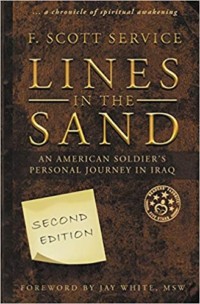Title: Lines in the Sand: An American Soldier’s Personal Journey In Iraq
Author: F. Scott Service
Publisher: MindStir Media
ISBN: 978-1735588063
Pages: 442
Genre: Iraq History/Historical Middle East Biographies/Memoirs
Reviewed by: Anthony Avina
Pacific Book Review
 Whether we want to admit it or not, humanity as a whole is far too often ruled by violent tendencies than not. While many advocate for peace and equality, violence always finds a way of trickling into our grander societies, upsetting the balance and causing chaos wherever it goes. Yet not all of humanity is like this. As psychologist professor Steven Pinker once said, “Human nature is complex. Even if we do have inclinations toward violence, we also have inclination to empathy, to cooperation, to self-control.”
Whether we want to admit it or not, humanity as a whole is far too often ruled by violent tendencies than not. While many advocate for peace and equality, violence always finds a way of trickling into our grander societies, upsetting the balance and causing chaos wherever it goes. Yet not all of humanity is like this. As psychologist professor Steven Pinker once said, “Human nature is complex. Even if we do have inclinations toward violence, we also have inclination to empathy, to cooperation, to self-control.”
In author F. Scott Service’s Lines in the Sand: An American Soldier’s Personal Journey In Iraq, the author takes readers on an ever personal journey through their time serving overseas. The author found himself serving the military overseas and feeling a sense of duty to his fellow soldiers, and soon found himself facing the unyielding violence of war which forced him to face everything he ever believed and knew about himself. From the moment he discovered he’d be joining the military to the struggle to overcome PTSD after returning home, this is a powerful story of self-exploration, loss, and heartbreaking anguish.
This is a truly powerful, moving and emotional memoir. The author does an excellent job of conveying the confusion, the pain and the heartbreak that comes from being thrown into a war. The affect it has on soldiers both in their personal life and overseas serving was captured in detail here in this book, and the author did a great job of showing the impact the war had on both sides; both for the military men and women who served and those innocent civilians caught in the crossfire of a war they didn’t ask for. The exploration of the author’s personal downward spiral, as the effects of serving become apparent in his marriage and personal life, was a difficult and painful thing to read. Yet I commend the author greatly for delving so deeply into his personal struggles, which should open a more open dialogue about how soldiers are treated overall after their service.
A book such as this is perfect for those who enjoy memoirs, non-fiction reads which delve into more modern history, and the study of warfare on soldiers both personally and mentally. As a fan of memoirs, it was truly engaging to read the author’s experiences, especially as the writing style itself was presented as a series of journal entries kept during his time overseas. His look at things like how much easier it is to kill as a soldier than it is to take the time to understand the viewpoints of the enemy and find common ground for a more peaceful solution is truly profound and moving, and something we all should heed. As an anti-war civilian who hopes for a more peaceful future, the viewpoints of an anti-war soldier such as the author are important and truly memorable.
A tragic, moving and thought-provoking memoir, author F. Scott Service’s Lines in the Sand: An American Soldier’s Personal Journey In Iraq is a must-read memoir. The writing is eloquent and beautifully moving, and captures the raw emotions and moments of those serving overseas. Those hoping to find personal experiences in war to help promote a more peaceful future and get help for those soldiers who return home will not want to miss out on this impactful read.


